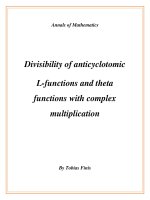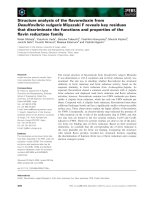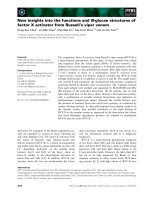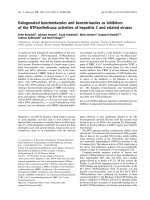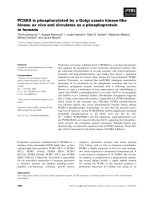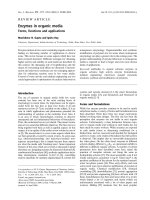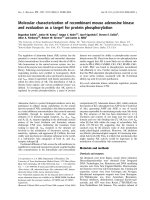Functions and variables as symbols
Bạn đang xem bản rút gọn của tài liệu. Xem và tải ngay bản đầy đủ của tài liệu tại đây (530.52 KB, 46 trang )
6.087 Lecture 9 – January 22, 2010
Review
Using External Libraries
Symbols and Linkage
Static vs. Dynamic Linkage
Linking External Libraries
Symbol Resolution Issues
Creating Libraries
Data Structures
B-trees
Priority Queues
1
Review: Void pointers
•
Void pointer – points to any data type:
int x; void ∗ px = &x; /∗ implicit cast to (void ∗) ∗/
float f ; void
∗ pf = &f;
•
Cannot be dereferenced directly; void pointers must be
cast prior to dereferencing:
p r i n t f ( "%d %f\n" , ∗ ( in t ∗ ) px , ∗ ( f l o a t ∗ ) p f ) ;
1
Review: Function pointers
•
Functions not variables, but also reside in memory (i.e.
have an address) – we can take a pointer to a function
•
Function pointer declaration:
int (∗cmp)(void ∗, void ∗);
•
Can be treated like any other pointer
•
No need to use & operator (but you can)
•
Similarly, no need to use
*
operator (but you can)
2
Review: Function pointers
i n t strcmp_wrapper ( void pa , void pb ) {∗ ∗
retu rn strcmp ( ( const char ∗ ) pa , ( const char ∗) pb ) ;
}
•
Can assign to a function pointer:
int (∗fp )(void ∗, void ∗) = strcmp_wrapper;
or
int (∗fp )(void ∗, void ∗) = &strcmp_wrapper;
•
Can call from function pointer: (str1 and str2 are
strings)
int ret = fp( str1 , str2 );
or
int ret = (∗fp )( str1 , str2 );
3
Review: Hash tables
•
Hash table (or hash map): array of linked lists for storing
and accessing data efficiently
•
Each element associated with a key (can be an integer,
string, or other type)
•
Hash function computes hash value from key (and table
size); hash value represents index into array
•
Multiple elements can have same hash value – results in
collision; elements are chained in linked list
4
6.087 Lecture 9 – January 22, 2010
Review
Using External Libraries
Symbols and Linkage
Static vs. Dynamic Linkage
Linking External Libraries
Symbol Resolution Issues
Creating Libraries
Data Structures
B-trees
Priority Queues
5
Symbols and libraries
•
External libraries provide a wealth of functionality –
example: C standard library
•
Programs access libraries’ functions and variables via
identifiers known as symbols
•
Header file declarations/prototypes mapped to symbols at
compile time
•
Symbols linked to definitions in external libraries during
linking
•
Our own program produces symbols, too
5
Functions and variables as symbols
•
Consider the simple hello world program written below:
#include < s t d i o . h>
const char msg [ ] = "Hello, world." ;
i n t main ( void ) {
puts ( msg ) ;
retu rn 0 ;
}
•
What variables and functions are declared globally?
6
Functions and variables as symbols
•
Consider the simple hello world program written below:
#include < s t d i o . h>
const char msg [ ] = "Hello, world." ;
i n t main ( void ) {
puts ( msg ) ;
retu rn 0 ;
}
•
What variables and functions are declared globally?
msg, main(), puts(), others in stdio.h
6
Functions and variables as symbols
•
Let’s compile, but not link, the file hello.c to create hello.o:
athena% gcc -Wall -c hello.c -o hello.o
•
-c: compile, but do not link hello.c; result will compile the
code into machine instructions but not make the program
executable
•
addresses for lines of code and static and global variables
not yet assigned
•
need to perform link step on hello.o (using gcc or ld) to
assign memory to each symbol
•
linking resolves symbols defined elsewhere (like the C
standard library) and makes the code executable
7
1
Athena is MIT's UNIX-based computing environment. OCW does not provide access to it.
1
Functions and variables as symbols
•
Let’s look at the symbols in the compiled file hello.o:
athena% nm hello.o
•
Output:
0000000000000000 T main
0000000000000000 R msg
U puts
•
’T’ – (text) code; ’R’ – read-only memory; ’U’ - undefined
symbol
•
Addresses all zero before linking; symbols not allocated
memory yet
•
Undefined symbols are defined externally, resolved during
linking
8
Athena is MIT's UNIX-based computing environment. OCW does not provide access to it..
1
1
Functions and variables as symbols
•
Why aren’t symbols listed for other declarations in
stdio.h?
•
Compiler doesn’t bother creating symbols for unused
function prototypes (saves space)
•
What happens when we link?
athena% gcc -Wall hello.o -o hello
•
Memory allocated for defined symbols
•
Undefined symbols located in external libraries (like libc
for C standard library)
9
Athena is MIT's UNIX-based computing environment. OCW does not provide access to it.
1
1
Functions and variables as symbols
•
Let’s look at the symbols now:
athena% nm hello
•
Output:
(other default symbols)
.
.
.
0000000000400524 T main
000000000040062c R msg
U puts@@GLIBC_2.2.5
•
Addresses for static (allocated at compile time) symbols
•
Symbol puts located in shared library GLIBC_2.2.5 (GNU
C standard library)
•
Shared symbol puts not assigned memory until run time
10
Athena is MIT's UNIX-based computing environment. OCW does not provide access to it.
1
1
Static and dynamic linkage
•
Functions, global variables must be allocated memory
before use
•
Can allocate at compile time (static) or at run time (shared)
•
Advantages/disadvantages to both
•
Symbols in same file, other .o files, or static libraries
(archives, .a files) – static linkage
•
Symbols in shared libraries (.so files) – dynamic linkage
•
gcc links against shared libraries by default, can force
static linkage using -static flag
11
Static linkage
•
What happens if we statically link against the library?
athena% gcc -Wall -static hello.o -o hello
•
Our executable now contains the symbol puts:
.
.
.
00000000004014c0 W puts
.
.
.
0000000000400304 T main
.
.
.
000000000046cd04 R msg
.
.
.
•
’W’: linked to another defined symbol
12
Athena is MIT's UNIX-based computing environment. OCW does not provide access to it.
1
1
Static linkage
•
At link time, statically linked symbols added to executable
•
Results in much larger executable file (static – 688K,
dynamic – 10K)
•
Resulting executable does not depend on locating external
library files at run time
•
To use newer version of library, have to recompile
13
Dynamic linkage
•
Dynamic linkage occurs at run-time
•
During compile, linker just looks for symbol in external
shared libraries
•
Shared library symbols loaded as part of program startup
(before main())
•
Requires external library to define symbol exactly as
expected from header file declaration
•
changing function in shared library can break your program
•
version information used to minimize this problem
•
reason why common libraries like libc rarely modify or
remove functions, even broken ones like gets()
14
Linking external libraries
•
Programs linked against C standard library by default
•
To link against library libnamespec.so or
libnamespec.a, use compiler flag -lnamespec to link
against library
•
Library must be in library path (standard library directories
+ directories specified using -L directory compiler flag
•
Use -static for force static linkage
•
This is enough for static linkage; library code will be added
to resulting executable
15


